Erstwhile Central Intelligence Agency analyst on South Asia, Lisa Curtis knows exactly the kind of painstaking research that would have gone into ultimately locating the whereabouts of Osama bin Laden where CIA analysts, operatives, and finally the elite Navy SEALS team worked in tandem to ferret out the Al Qaeda leader, living in the $1 million mansion in Abbottabad.
Curtis can also understand the seething anger among lawmakers when they find the aid recipient -- in this case Pakistan -- has been taking the American taxpayer for a ride. In their eyes, Pakistan was complicit in providing a safe haven for bin Laden.
Also a former diplomat, Curtis who was based in Islamabad can also empathise with the difficult treading diplomats from Secretary of State Hillary Clinton downwards have now to do in order to make sure that the US-Pakistan relationship doesn't begin to unravel and the level of mistrust becomes irreparable.
...
'The worst is yet to come'
Curtis told rediff.com that "as the reality sinks in that the mastermind of the 9/11 attacks resided comfortably in a Pakistani military cantonment area perhaps for nearly six years, US lawmakers' questions and anger are understandably growing. There are serious calls for stopping aid to Pakistan until it is determined that Pakistani security officials were not involved in harboring Osama bin Laden."
Curtis, currently Senior Research Fellow and head of the South Asia Programme at the conservative Heritage Foundation -- a Washington, DC-based think tank -- said, "The treasure trove of intelligence confiscated at the compound by the Navy SEALS may hold the key to answering this question," and argued that "until that information is culled by intelligence professionals, it is reasonable for the US to with withhold -- but perhaps not cut off altogether -- aid disbursements to Pakistan."
She said, "The bin Laden operation has already caused a major breach in the US-Pakistan partnership. Pakistan watchers within the administration who supported strengthening the partnership through efforts like the Strategic Dialogue have expressed a deep sense of disappointment and demoralisation from the revelations surfacing about the compound, and they fear the worst is yet to come."
"The bin Laden operation and its aftermath seem set to change the dynamics of the US-Pakistan relationship in unpredictable and far-reaching ways," Curtis predicted.
'Pakistani leaders' credibility is not very high at the moment'
However, she noted that "the statements by President Obama and Hillary Clinton acknowledging Pakistani counterterrorism cooperation over the years appear to leave the door open for patching up ties, if Pakistan decides it values the partnership and is willing to make changes in its own counterterrorism policies."
But Curtis said, "The status quo in Pakistan's policies toward the Afghan Taliban and Haqqani network, for example, will not be acceptable from here on out. The US is likely to use Pakistan's failures against bin Laden to press for more cooperation in Afghanistan."
"Pakistani leaders are flailing about with various explanations for their lapses, but what they don't seem to realise is that their credibility is not very high in Washington at the moment," she said.
"Pakistani complaints about the US violation of its sovereignty will fall on deaf ears in Washington and could sour opinions toward Islamabad even more."
Thus Curtis argued that "rather than focusing all of their energy on simply deflecting criticism, Pakistani leaders would do well to engage in some soul-searching and reflection on whether they want to continue to reinforce their reputation as the 'epicenter of international terrorism' or would prefer instead to begin to turn over a new leaf."
'How could the Pakistani establishment not know?'
Former diplomat Howard Schaffer acknowledged that in the wake of the bin Laden's killing and Pakistan's embarrassment and humiliation that he was living right under their nose, necessarily adds a new dimension to his book "and turns its on its head."
Schaffer, currently a professor of diplomacy at Georgetown University's Schools of Foreign Policy Studies, said, "Pakistan used to always give the US the guilt trip, saying it had abandoned Pakistan, now finds the roles reversed. Now the US can turn it around and give Pakistan the guilt trip about how it was badly let down by Pakistan."
He also said he fully agreed with White House officials John Brennan that it was "inconceivable" that some elements in the Pakistani military and intelligence wouldn't have known that bin Laden was holed up where he was, on the outskirts of Islamabad and in close proximity to Pakistan's elite military academy.
Schaffer said, "Having spent more than 30 years in and on South Asia," told rediff.com, "As you know being a South Asian, these things just cannot be kept secret for so long. Everyone knows everything and everybody who lives around and what people are cooking for lunch or dinner and who's visiting whom."
"So it is simply incredulous to believe that some elements of the Pakistani military and intelligence establishment were not aware that bin Laden was living where he was and possibly could have been the ones who even arranged for his cover and provided all the support network."
'US and Pakistan can't afford a third divorce'
But Schaffer, who in his book How Pakistan Negotiates with the United States: Riding the Roller-Coaster spoke of how the US and Pakistan had experienced "three marriages and two divorces," said both countries simply couldn't "afford a third divorce," even though "their trust deficit has hit a new low," as the "stakes are just too high."
He said suspending aid and/or attempting to punish Pakistan would be highly counterproductive and could send this nuclear-armed country into a tail-spin and ultimately provide the terrorists with 'a perverted victory."
Thus, he said it was imperative that both countries "engage in some frank and candid private conversations," and get the relationship back on track, notwithstanding all of the anger and mistrust and mutual suspicion on both sides.
Schaffer said it would be "particularly dangerous" to rub it in to the Pakistani military and intelligence, considering "all of the embarrassment and humiliation it's already undergoing in the eyes of the Pakistani people."
'The Pakistan military stands exposed'
Deepa Ollapally, political science professor at the George Washington University's Elliott School of International Affairs, said: "There are likely to be several repercussions from Osama bin Laden's demise and the Pakistan military's apparent double-dealing."
She believed Pakistan "could be at a turning point, quite like the one it was right after 9/11. Pakistan's claim of not knowing Osama's presence in the garrison city of Abottabad, crawling with military and security personnel, seem truly incredulous."
"In the eyes of most outside observers, the Pakistan military stands exposed -- at minimum for utter incompetence, if not brazen complicity, allowing Osama safe haven in a $1 million house, streets from the country's equivalent of West Point," she said, and predicted, " Its going to be next to impossible for Pakistan to re-gain any strong credibility with the US and Pakistan is no doubt coming under unprecedented pressure from the US to cut its ties with terrorist groups once and for all in a believable fashion."
'US is eager to leave the Afghan mess behind'
Ollapally, acknowledged, "This is however, not a very likely outcome. After more than 10 years, the US is eager to leave the Afghan mess behind and declare some kind of 'victory' at the first opportunity."
She said that bin Laden's death could provide that. "Of course, this is exactly what the Pakistan military has been counting on, because whatever those on the outside might say, Pakistan has the advantage of geography. And its long standing ties with the Afghan Taliban and other jihadist groups puts Islamabad in a strong position to fill the vacuum once the US departs."
Ollapally warned, " This is a grim scenario for India. There are no good options for India in Afghanistan except to maintain its presence by stepping up development assistance and by cultivating more partners domestically. At the same time, India needs to keep the recently renewed bilateral talks with Pakistan going forward -- with the hope that their relations can be kept stable despite all the uncertainties in the region right now."
Kayani and co are embarrassed
Michael Krepon, founder and now founder-emeritus of the Henry Stimson Centre, recalled, "Abbottabad is a quiet, lovely city and the Stimson Centre convened a Track II workshop there for rising Pakistani strategic analysts."
"The city's most prominent feature remains Kakul, the Pakistani military academy where outstanding recruits begin their studies and service careers," he noted and recalled, "On April 23, the Pakistani Chief of Army Staff, General Ashfaq Kayani, visited Kakul to congratulate recent graduates.
According to press accounts of the Army Chief's remarks, Kayani claimed that Pakistani security forces 'have broken the back of terrorists and the nation will soon prevail over the menace.'
He noted that "Kayani also asserted that the Pakistan Army 'was completely aware of internal and external threats to the country", and said now so embarrassingly it was found that "Osama bin Laden's compound was a mile away from the parade ground where Kayani spoke."
What if US special forces had failed...
Krepon acknowledged that had "US special forces and intelligence failed in this effort, the repercussions on US-Pakistan relations would have been horrific. Having succeeded in bringing Osama bin Laden to justice, the repercussions are extremely trying but not grounds for a divorce."
He predicted, "Hard times lie ahead for US-Pakistan relations. Our interests in Afghanistan diverge as well as converge. Groups that engage in violent acts against US and allied forces in Afghanistan and against targets in India are based, trained and equipped on Pakistani soil, without serious interference by Pakistan's security apparatus."
Krepon said, "It is far more convenient and popular for Pakistani politicians to rail against US drone strikes than against extensive Muslim-on-Muslim violence within their country."
He said, "Osama's death provides an opportunity for Pakistani and US authorities to reconsider the sources of their deeply troubled relationship."

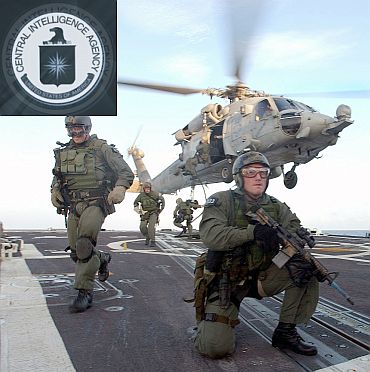
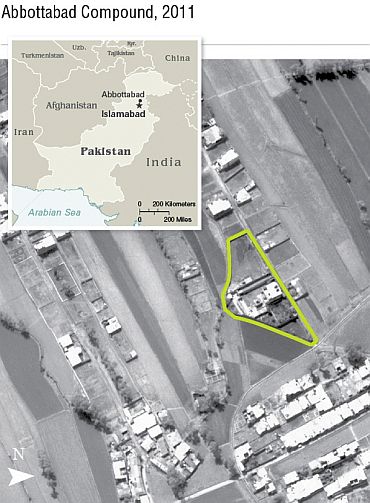

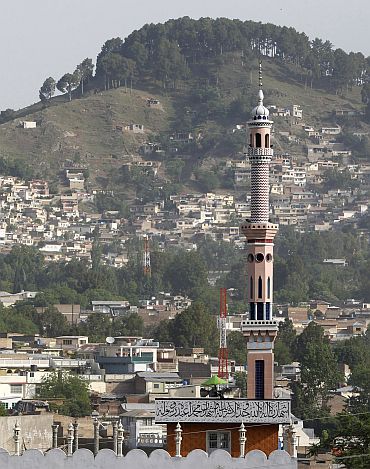
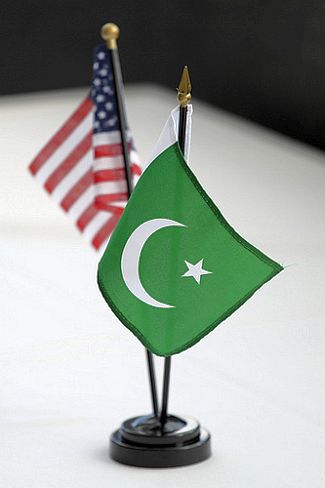


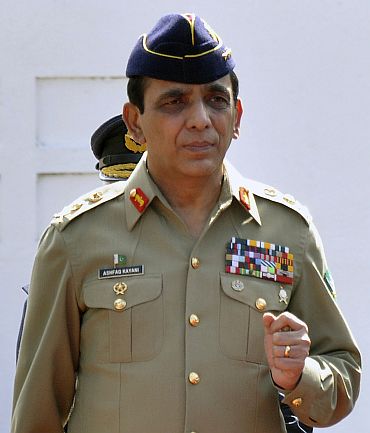

article